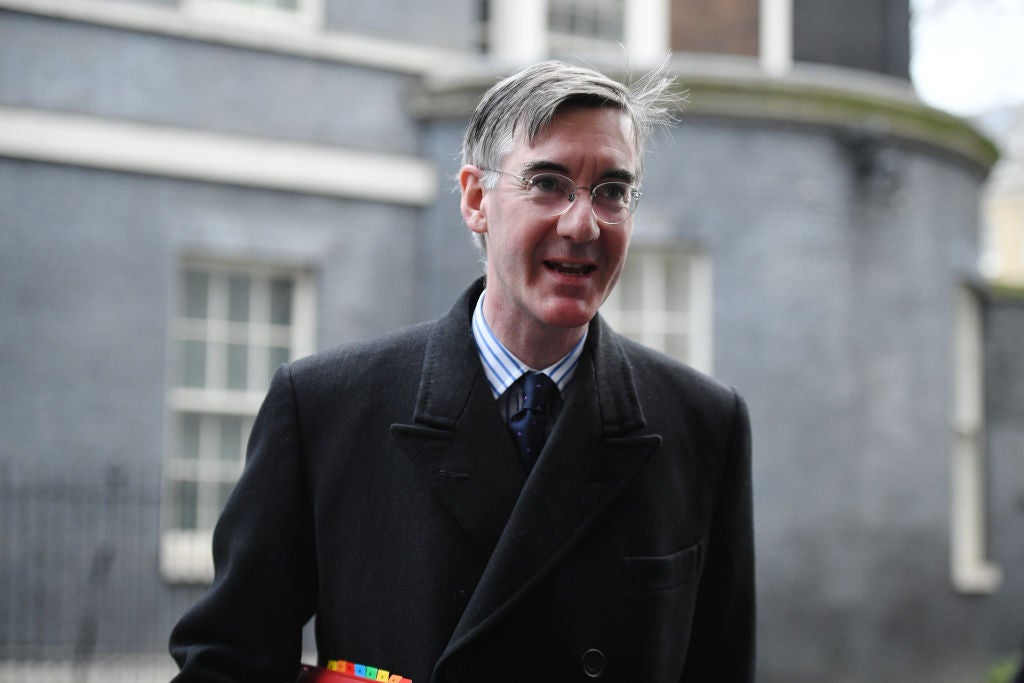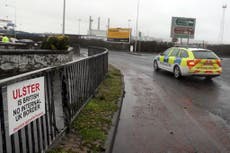Arch-Brexiteer Jacob Rees-Mogg suggests unionist parties could undo protocol after 2024 elections
But DUP insists it ‘would not be kicking the issue down the road’

Your support helps us to tell the story
From reproductive rights to climate change to Big Tech, The Independent is on the ground when the story is developing. Whether it's investigating the financials of Elon Musk's pro-Trump PAC or producing our latest documentary, 'The A Word', which shines a light on the American women fighting for reproductive rights, we know how important it is to parse out the facts from the messaging.
At such a critical moment in US history, we need reporters on the ground. Your donation allows us to keep sending journalists to speak to both sides of the story.
The Independent is trusted by Americans across the entire political spectrum. And unlike many other quality news outlets, we choose not to lock Americans out of our reporting and analysis with paywalls. We believe quality journalism should be available to everyone, paid for by those who can afford it.
Your support makes all the difference.Senior Tory MP and arch-Brexiteer Jacob Rees-Mogg has suggested unionist parties could undo the Northern Ireland protocol his government has agreed to fully implement if they sweep to victory at local elections in 2024.
The North East Somerset MP and leader of the House of Commons said unionist members of NI's Assembly could "get rid of the protocol" by uniting but urged them not to collapse Stormont's institutions.
Mr Rees-Mogg's comments came less than a week after Cabinet Office minister Michael Gove and European Commission vice president Maroš Šefcovic announced in a joint statement that both sides are committed to making the protocol work for the "benefit of everyone" in NI.
Prime minister Boris Johnson said earlier this year he would be willing to trigger a clause in the Brexit deal that would remove the protocol. That position appears to have slipped away following pushback from the EU and the Irish government, which played a key role in the Brexit talks.
Anger has been growing within the unionist, or loyalist, community over the protocol ever since it was implemented in January at the end of the Brexit transition period.
Unionists say it creates trade barriers between NI and the rest of the UK.
In an interview with Sunday Life, Mr Rees-Mogg, who voted for his government's Brexit Withdrawal Agreement and the NI protocol, said unionist parties should "work through the democratic processes" as opposed to collapsing Stormont.
If unionists can win a majority at the 2024 Assembly elections then "then they can vote down the protocol", Mr Rees-Mogg said, adding: "I think Northern Ireland often gets overlooked in the union discussion, but Northern Ireland is part of my country and we should not forget that."
The NI protocol was agreed by the UK government and the EU as a method to avoid a hard border on the island of Ireland by keeping NI in the bloc's customs union. In their joint statement on Wednesday last week, Mr Gove and Mr Šefcovic reiterated their desire to find "pragmatic solutions" to the implementation of the protocol
Despite Mr Rees-Mogg's intervention, DUP Brexit spokesman and East Antrim MP Sammy Wilson said his party – which earlier this year launched an official campaign to have the protocol removed – "would not be kicking the issue down the road".
"We will fight guerrilla warfare against this, until the big battle opportunity comes," Mr Wilson added. "We will be challenging the government on a daily basis, telling them to do what they can now to undo the damage done to Northern Ireland."
Rees-Mogg's comments were criticised by the former Brexit Party MEP Ben Habib, who is supporting a coalition of unionist politicians who have announced a legal challenge against the protocol.
"It is disingenuous of Jacob Rees-Mogg to say unionists can get rid of the Protocol in the years ahead," Mr Habib tweeted on Sunday. "The onus is not on them to get rid of it. The onus was on Boris Johnson first to gain their agreement. They do not agree".
Tensions escalated on Friday when DUP agriculture minister Gordon Lyons ordered officials to stop construction of permanent facilities for post-Brexit checks on agri-food products arriving in NI from Great Britain.
Mr Lyons said his move was in response to the “practical difficulties” caused by the protocol but opposition politicians accused the minister of a political “stunt”.
A growing number of NI’s unionist politicians have said bringing down the devolved government remains an option in opposing the protocol as anger continues to grow within the community.
But opposition parties in NI argue they are not engaging in constructive efforts to find workable solutions to some of the problems presented by the protocol.
On Monday Mr Lyons's move to halt construction on port facilities will be debated by Stormont MLAs after SDLP deputy leader and minister for infrastructure Nichola Mallon called for an emergency meeting of the executive.
Sinn Fein, the SDLP and Alliance Party – the three pro-remain executive parties – have already heavily criticised Mr Lyons's decision, insisting he does not have the authority to act unilaterally on issues considered controversial.
As well as ordering officials to halt construction of permanent inspection facilities for regulatory checks on agri-food goods arriving from GB, Mr Lyons also stopped further recruitment of inspection staff and said charges would not be levied at the ports on traders bringing goods into Northern Ireland from the rest of the UK.
SDLP leader and Foyle MP Colum Eastwood criticised the action. He said: “It is deeply concerning that DUP ministers are actively trying to sabotage the arrangements and inject further uncertainty into a difficult situation for local businesses to suit their own narrow political interests.
Mr Lyons said his move was in response to the “practical difficulties” caused by the protocol.
He cited uncertainty over the movement of goods when grace periods currently limiting protocol bureaucracy end at the start of April.
Mr Lyons’s Department of Agriculture, Environment and Rural Affairs has been fulfilling the UK government’s legal duty to construct the facilities under the terms of the Brexit Withdrawal Agreement.
Asked about his obligation to fulfil the UK’s responsibilities under the Brexit international treaty, Mr Lyons insisted he was acting in a “reasonable and proportionate” manner in response to the uncertainty around the protocol.
On Friday night, a government spokesman said: “This is a matter for the Northern Ireland Executive.”
Additional reporting by Press Association

Join our commenting forum
Join thought-provoking conversations, follow other Independent readers and see their replies
Comments